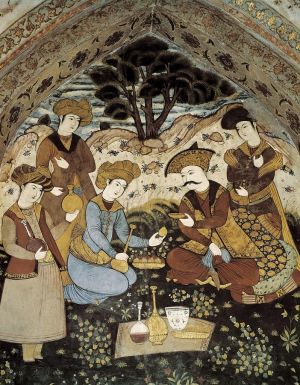(Boylove Documentary Sourcebook) - The Imperial Courtly Encomiastic Device of Pederastic Lyrical Discourse in Classical Persian Literature, as Featured in a Poem by Farrokhi Sistāni

From "'A Marvelous Painting': the Erotic Dimension of Saʿdi's Praise Poetry" by Domenico Ingenito, in Journal of Persianate Studies, Vol. 12, No. 1 (December 2019). Footnote omitted.
In fact, if we look at the tradition of the Ghaznavid qasida, many of Farrokhi’s poems dedicated to Sultan Mahmud’s sons highlight the playfulness of the homoerotic discourse as a political mediation between the poet and the prince:
In love I am with the silver-chested boys with ruby lips;
Anywhere you see one of them you’re sure to find me there!
I love their white complexion when it shines as bright and pure as the morning;
I love their black hair, as dark as the night and its obscurity.
Anyone who possesses such moon-faced beauties whose hair is musky,
Will not be forgiven if for one moment he does not indulge in pleasures.
As soon as they sit, one should never take his eyes off them;
As soon as they stand up, one should never stop pressing his mouth against their lips.
If God had bestowed upon me one of these idol-faced boys,
How many passionate kisses I would have given his lips!
O happy days, when my house was full of such boys,
With their silver chests and their golden garments:
Their candid buttocks, as rounded as hillocks of jasmine,
Their slim and slender waists: as thin as fine brushes;
As pleasing and beautiful as the ghazals of Shahid
As enchanting and charming as the songs of Abu Talab.
Who cares if my house is now deprived of such idols,
As filled is my heart with praises for the king, son of kings.
FARROKHI SISTĀNI, 4

See also
- Adult friend (dictionary)
- Age of attraction (dictionary)
- Boylove
- Ephebophilia
- Ghilman
- Köçek
- Loved boy (dictionary)
- Minor-attracted person (dictionary)
- Pedophilia
- Sufism
- Tellak
- Young friend (dictionary)